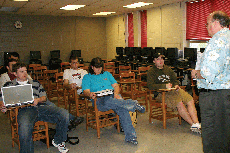Learning takes on a new face as the instructors and students of Nicholls team up to create a virtual world of the campus. A learning community is anytime you bring people together to work on a similar theme, project or shared interest, Wendy Rachal, assistant professor of English, said.
“We have students coming from all these different disciplines to do one thing that, in the real world, any one of them could be involved in,” Rachal said
The participants developing this virtual world will begin this semester.
“Our theme is to develop a virtual world of Nicholls where students will be able to go in and walk around campus and find out about the University,” Kent White, associate professor of computer science, said.
Prospective students will have the opportunity of visiting the campus and seeing what the campus has to offer. “They will be able to go into the buildings, maybe meet some of the department heads or some of the faculty to get a history of Nicholls and to see what the different courses are about,” White said.
The nursing department might have a game that would allow the students to triage a sick patient.
“Not only can you get a tour of the University, learn about the majors, learn why students like their majors and get that path finding opportunities; there will also be the opportunity to walk into the stadium and play a game of football, or go into the nursing building and work on a sick person and have to figure out what is wrong with them,” Rachal said.
All the departments have to work together in the set up of the learning community, Kent said.
Rachal’s technical writing class will start laying the outline for the documentation for everything that goes on within the virtual community.
“My technical writing students have developed a wiki, which is a collaborative work space online to house documentation, and we will be interviewing and doing resumes for each student who is involved in the process so we can advertise on the computer science Web site that our students have done these amazing things,” Rachal said.
“We see the learning community as a way to simply market what the students do,” Rachal said.
The mission of the learning community is to motivate students to go out in the real world and interact with people of different disciplines, White said.
Students involved in the creative process of setting up the program will also receive class credit for their hard work, White said.
The students and instructors will have to step outside the box and learn what the other disciplines are doing in order for the project to be successful, White said.
“The biggest advantage of this is English people think different from computer science people; computer science people think different from art people,” White said.
By bringing these different disciplines together, they learn how to communicate with people that think differently than themselves so when they get out in the real world they will know how to communicate with other disciplines and not be narrow in their thinking, White said.
“The whole idea for the learning community grows out of Nicholls’ commitment to quality enhancement,” Rachal said.








